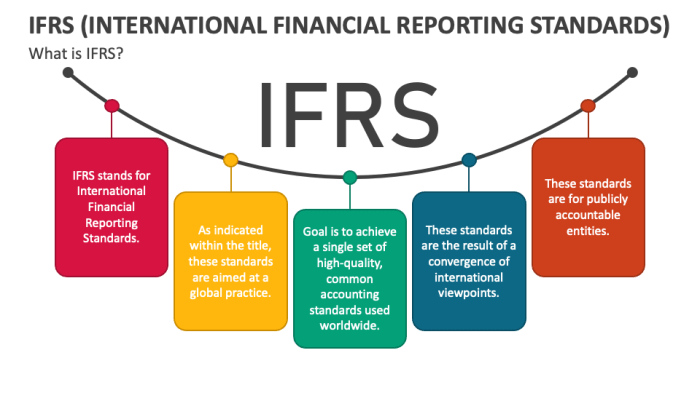How International Financial Reporting Standards (IFRS) Influence Trade is a topic of significant global importance. The standardization of accounting practices, a seemingly technical issue, has profound implications for international commerce, impacting everything from foreign direct investment to cross-border mergers and acquisitions. This exploration delves into the multifaceted ways IFRS fosters transparency, reduces risk, and ultimately facilitates smoother and more efficient global trade.
By creating a common language for financial reporting, IFRS enhances comparability across nations, making it easier for businesses to attract international investment and participate in global markets. This improved transparency reduces information asymmetry, a key obstacle to international trade, and allows for more informed decision-making by investors, lenders, and businesses alike. The impact extends to supply chains, credit ratings, and the overall attractiveness of countries as investment destinations.
IFRS Harmonization and Trade Facilitation: How International Financial Reporting Standards (IFRS) Influence Trade
The adoption of International Financial Reporting Standards (IFRS) has significantly impacted global trade by fostering greater transparency and comparability in financial reporting. This standardization reduces information asymmetry, facilitates cross-border transactions, and ultimately contributes to a more efficient and integrated global marketplace.
Reduced Information Asymmetry Through IFRS Standardization
Standardized financial reporting under IFRS significantly reduces information asymmetry between trading partners. Before widespread IFRS adoption, companies in different countries often used diverse accounting practices, making it difficult to compare their financial performance accurately. This lack of comparability increased the risk for investors and lenders engaging in international transactions. IFRS provides a common language, allowing businesses to present their financial information in a consistent and understandable manner across borders. This increased transparency reduces uncertainty and encourages greater participation in international trade. For instance, a potential investor in a German company can now easily compare its financial statements to those of a similar company in the United States, thanks to the consistent application of IFRS.
Impact of IFRS Adoption on Cross-Border Mergers and Acquisitions
IFRS adoption has streamlined cross-border mergers and acquisitions (M&A) considerably. The consistent accounting standards facilitate the valuation process, making it easier to compare the financial health of companies across different jurisdictions. This reduces the time and cost associated with due diligence, leading to smoother and more efficient M&A transactions. Without IFRS, reconciling different accounting standards would be a significant hurdle, potentially delaying or even preventing deals from closing. The ease of comparison offered by IFRS also allows for more informed decision-making by acquirers and target companies, leading to more successful and beneficial mergers and acquisitions.
Improved Comparability of Financial Statements for International Investors
IFRS enhances the comparability of financial statements for international investors, fostering greater cross-border investment. Investors can readily analyze the financial performance and risk profiles of companies across different countries, making more informed investment decisions. This increased transparency and comparability attracts more foreign direct investment (FDI), boosting economic growth in participating countries. For example, a pension fund in Japan can easily compare the financial statements of a technology company in Silicon Valley with those of a similar company in India, making it easier to diversify its portfolio and achieve its investment objectives.
Ease of Cross-Border Investment in the Technology Industry: Pre- and Post-IFRS Adoption
The following table illustrates the impact of IFRS adoption on cross-border investment in the technology sector. Note that these figures are illustrative and based on general observations rather than precise, quantifiable data, due to the complexity of isolating the impact of IFRS from other factors influencing investment.
| Country | Pre-IFRS Investment (Illustrative) | Post-IFRS Investment (Illustrative) | Impact |
|---|---|---|---|
| United States | High, but with some challenges in comparing to non-US companies | High, increased ease of comparison with international companies | Increased FDI inflow, more efficient M&A activity |
| India | Relatively low due to accounting inconsistencies | Significant increase due to improved transparency | Greater attraction of foreign investment, enhanced market integration |
| China | Moderate, with significant challenges in data reliability | Increased, though data harmonization still ongoing | Gradual increase in FDI, but still facing challenges in full transparency |
| Germany | High, but with complexities in comparing to companies using different standards | High, simplified comparison with other IFRS-adopting countries | Increased ease of cross-border transactions, particularly M&A |
IFRS and Foreign Direct Investment (FDI)
The adoption of International Financial Reporting Standards (IFRS) significantly impacts a country’s attractiveness as a destination for Foreign Direct Investment (FDI). Consistent and transparent financial reporting, a hallmark of IFRS compliance, fosters investor confidence and reduces perceived risk, thereby influencing capital flows across borders. This section explores the multifaceted relationship between IFRS and FDI.
IFRS Compliance and FDI Attractiveness
Transparent and reliable financial reporting, a key outcome of IFRS adoption, is a major factor influencing a country’s attractiveness to foreign investors. Investors require clear and consistent financial information to accurately assess the risks and potential returns of an investment. IFRS provides a common accounting language, reducing information asymmetry and making it easier for investors to compare companies across different countries. This enhanced comparability fosters greater investor confidence, encouraging higher levels of FDI. Conversely, countries with inconsistent or opaque accounting standards face higher risks of attracting less FDI.
Reduced Risk for Foreign Investors through IFRS, How International Financial Reporting Standards (IFRS) Influence Trade
The standardized nature of IFRS reduces information asymmetry and uncertainty for foreign investors. The consistent application of IFRS across multiple jurisdictions allows for a more accurate and reliable assessment of a company’s financial health. This reduces the risk of making investment decisions based on misleading or incomparable financial information. Furthermore, IFRS’s emphasis on fair value accounting and disclosures provides a more comprehensive picture of a company’s assets and liabilities, improving the transparency and reliability of financial statements. This transparency is crucial in mitigating the risks associated with cross-border investments.
Case Studies: IFRS Influence on FDI Flows
While precise quantification of IFRS’s impact on FDI is complex due to the interplay of numerous economic factors, several case studies illustrate its influence. For example, the adoption of IFRS in several European Union member states coincided with an increase in FDI inflows. This suggests a positive correlation, although other contributing factors must be considered. Similarly, countries in the Asia-Pacific region that have embraced IFRS have generally seen increased FDI, indicating that consistent accounting standards can attract foreign capital. Conversely, regions with less robust accounting standards often face challenges in attracting FDI due to higher perceived investment risk.
Hypothetical Scenario: Inconsistent Accounting Standards and FDI
Imagine a scenario where Country A utilizes a unique, domestically developed accounting standard, while Country B adopts IFRS. A multinational corporation considering FDI in either country would find it significantly easier to assess the financial health and risks of companies in Country B due to the internationally recognized and understood nature of IFRS. The complexities and uncertainties associated with interpreting Country A’s unique standards would likely deter the corporation, resulting in a preference for investing in Country B. This hypothetical scenario highlights the significant advantage IFRS offers in attracting FDI compared to inconsistent or less transparent accounting practices.
IFRS and International Lending and Borrowing
The adoption of International Financial Reporting Standards (IFRS) has significantly impacted the landscape of international lending and borrowing. The increased comparability and transparency offered by IFRS facilitate a more efficient and streamlined process for cross-border financial transactions, although challenges remain. This section will explore the implications of IFRS on obtaining international loans, the key standards influencing credit assessments, and the benefits and challenges faced by banks in evaluating IFRS-based financial statements.
Ease of Obtaining International Loans: IFRS vs. National GAAP
Companies adhering to IFRS generally find it easier to secure international loans compared to those using national Generally Accepted Accounting Principles (GAAP). This is primarily because IFRS provides a globally recognized and consistent framework for financial reporting. International lenders are more comfortable evaluating financial statements prepared under IFRS as they understand the underlying accounting principles and can readily compare them across different jurisdictions. The reduced information asymmetry and increased transparency fostered by IFRS lead to lower perceived risk for lenders, resulting in potentially more favorable loan terms. In contrast, reliance on national GAAP can create complexities for lenders due to variations in accounting standards across countries, making it more difficult and time-consuming to assess creditworthiness.
Key IFRS Standards Influencing Credit Ratings and Risk Assessments
Several IFRS standards are particularly influential in shaping credit ratings and risk assessments for international borrowers. IFRS 9 (Financial Instruments) is crucial as it dictates how financial assets are measured and impaired, directly impacting a company’s reported financial position and profitability. IFRS 15 (Revenue from Contracts with Customers) clarifies revenue recognition, influencing a company’s cash flow projections and overall financial health. IFRS 16 (Leases) alters how lease obligations are accounted for, impacting a company’s debt levels and leverage ratios. These standards provide lenders with a clearer picture of a company’s financial risks, allowing for more accurate credit assessments and risk mitigation strategies. Furthermore, the consistency provided by IFRS across various jurisdictions simplifies the comparative analysis of borrowers’ financial performance.
Benefits and Challenges for Banks Evaluating IFRS Financial Statements
Banks encounter both benefits and challenges when evaluating financial statements prepared under IFRS. Benefits include increased comparability across different jurisdictions, leading to more efficient credit risk assessment. The enhanced transparency and disclosure requirements under IFRS facilitate a more comprehensive understanding of a borrower’s financial position and performance. This, in turn, allows banks to make more informed lending decisions and potentially reduce credit risk. However, challenges remain. The complexity of certain IFRS standards, particularly those related to financial instruments and accounting for complex transactions, can require specialized expertise and significant resources for accurate interpretation and analysis. Furthermore, the increased use of fair value accounting under IFRS can introduce volatility into reported financial figures, making it challenging to assess a company’s long-term financial stability.
Impact of IFRS on Interest Rates for International Debt Financing
The adoption of IFRS can indirectly influence interest rates for international debt financing. By reducing information asymmetry and enhancing transparency, IFRS can lower the perceived risk for lenders. This can translate into lower interest rates for borrowers deemed to be less risky due to the readily understandable and comparable nature of their IFRS-compliant financial statements. Conversely, companies with less transparent financial reporting, potentially due to inconsistencies in applying national GAAP, might face higher interest rates to compensate for the increased risk perceived by lenders. For instance, a company consistently adhering to IFRS and demonstrating strong financial performance under these standards might negotiate a lower interest rate on a syndicated loan compared to a similar company using a less transparent national GAAP. This illustrates the practical impact of IFRS on the cost of international borrowing.
IFRS and Cross-Border Supply Chains
The adoption of International Financial Reporting Standards (IFRS) has significantly impacted multinational corporations (MNCs) operating complex cross-border supply chains. Consistent financial reporting practices fostered by IFRS streamline various aspects of financial management, from auditing and consolidation to inventory valuation and transfer pricing, ultimately contributing to greater transparency and efficiency.
IFRS simplifies the auditing and consolidation of financial statements for MNCs with intricate supply chains by providing a common accounting language. This standardization reduces the complexities associated with reconciling diverse national accounting standards, leading to more efficient audits and a more reliable consolidated financial picture for investors and stakeholders. The consistent application of IFRS across subsidiaries allows for easier comparison of performance metrics and identification of areas for improvement within the global supply chain. This improved comparability strengthens internal controls and risk management processes.
Inventory Valuation and Cost Accounting within International Supply Chains
IFRS significantly influences inventory valuation and cost accounting practices within global supply chains. The adoption of IFRS necessitates the use of consistent inventory valuation methods (e.g., FIFO, weighted-average cost) across all subsidiaries, promoting greater comparability and accuracy in reporting inventory levels and costs. This consistency improves the accuracy of cost of goods sold calculations and enhances the reliability of financial statements. Furthermore, IFRS’s emphasis on fair value accounting can impact the valuation of certain inventory items, especially those subject to rapid price fluctuations. For example, a company dealing with volatile commodity prices might need to adjust inventory valuations frequently to reflect market realities, a practice more easily managed under the standardized reporting requirements of IFRS.
IFRS Influence on Transfer Pricing Decisions
IFRS does not directly dictate transfer pricing policies, but it significantly influences how these policies are documented and reported. Transfer pricing, the pricing of goods and services exchanged between related entities within a multinational corporation, is a critical aspect of tax planning and financial reporting. While the arm’s-length principle (pricing goods and services as if they were traded between unrelated parties) remains central, IFRS requires transparent and consistent documentation of the transfer pricing methodology used. This documentation must justify the pricing decisions made and demonstrate compliance with applicable tax regulations. Any discrepancies or inconsistencies in transfer pricing can lead to increased scrutiny from tax authorities and impact the reliability of the financial statements. The need for clear and comprehensive transfer pricing documentation under IFRS helps mitigate these risks.
Challenges and Opportunities Presented by IFRS for Managing Financial Risks Across Global Supply Chains
The implementation of IFRS presents both challenges and opportunities for managing financial risks across global supply chains.
- Challenge: Complexity of Implementation: Adopting and consistently applying IFRS across numerous subsidiaries with diverse accounting practices can be complex and costly, requiring significant investment in training and system upgrades.
- Challenge: Differences in Interpretation: While IFRS aims for standardization, variations in interpretation can still arise, leading to inconsistencies in financial reporting across different jurisdictions.
- Challenge: Foreign Exchange Risk: Fluctuations in exchange rates can significantly impact the translation of financial statements from subsidiaries operating in different currencies, creating volatility and increasing the complexity of financial risk management.
- Opportunity: Enhanced Transparency and Comparability: IFRS enhances transparency and comparability of financial information across subsidiaries, improving decision-making and investor confidence.
- Opportunity: Improved Risk Management: Standardized reporting facilitates a more comprehensive view of financial risks across the global supply chain, enabling more effective risk mitigation strategies.
- Opportunity: Facilitated Access to Capital: Consistent and reliable financial reporting under IFRS can enhance a company’s creditworthiness and improve its access to international capital markets.
IFRS and Investor Confidence in Emerging Markets

The adoption of International Financial Reporting Standards (IFRS) has significantly impacted investor confidence in emerging markets. By standardizing accounting practices, IFRS enhances the comparability and reliability of financial information, making it easier for international investors to assess risk and make informed investment decisions. This, in turn, facilitates capital inflows and contributes to economic growth in these regions.
IFRS adoption attracts foreign investment to emerging markets by reducing information asymmetry. Before widespread IFRS adoption, inconsistencies in accounting standards across different emerging markets created significant challenges for foreign investors trying to evaluate potential investments. The lack of transparency and comparability increased perceived risk and discouraged investment. The implementation of a globally recognized standard like IFRS mitigates these risks, making emerging markets more attractive to foreign capital.
IFRS Improves Credibility and Transparency of Financial Information
The improved credibility and transparency of financial information from companies in emerging markets under IFRS stems from its rigorous requirements for disclosure and consistent application of accounting principles. IFRS mandates detailed financial reporting, encompassing items such as revenue recognition, asset valuation, and debt management. This level of detail allows investors to gain a clearer understanding of a company’s financial health and performance, reducing the uncertainty and skepticism associated with companies operating in less regulated environments. This enhanced transparency reduces information asymmetry, a key barrier to foreign investment. The increased comparability of financial statements across different companies and countries further bolsters investor confidence, as investors can readily benchmark the performance of companies in emerging markets against those in developed economies.
Examples of Increased Investor Confidence due to IFRS Adoption
Several emerging markets have experienced increased foreign direct investment (FDI) following the adoption of IFRS. For example, Brazil’s adoption of IFRS led to a noticeable increase in FDI inflows, as international investors gained greater confidence in the reliability of Brazilian companies’ financial statements. Similarly, India’s move towards IFRS convergence has also been associated with increased investor interest, although the impact may be more gradual and nuanced due to other factors influencing investment decisions. While quantifying the exact impact of IFRS adoption on FDI is complex due to other macroeconomic factors, numerous studies suggest a positive correlation.
Visual Representation of IFRS Adoption and Foreign Investment Inflows
A line graph could effectively illustrate the correlation between IFRS adoption and foreign investment inflows in emerging markets. The horizontal (x) axis would represent time, spanning several years, marking significant milestones in IFRS adoption in a selected group of emerging markets (e.g., the year of initial adoption or full convergence). The vertical (y) axis would represent the total FDI inflows (in billions of USD, for instance) into those same emerging markets. Data points would plot the FDI inflows for each year, with different colored lines representing different emerging markets. The graph would visually demonstrate whether an increase in FDI inflows correlates with the adoption and implementation of IFRS. A positive correlation would be indicated by a general upward trend in the FDI lines after the respective IFRS adoption milestones. It’s crucial to note that this visual representation would need to control for other macroeconomic factors influencing FDI to isolate the impact of IFRS adoption.
Outcome Summary
In conclusion, the influence of International Financial Reporting Standards (IFRS) on international trade is undeniable. The standardization provided by IFRS fosters trust, transparency, and efficiency in global markets. While challenges remain, particularly in ensuring consistent adoption and enforcement across diverse jurisdictions, the overall impact of IFRS is demonstrably positive, contributing to a more integrated and robust global economy. The continued harmonization and improvement of IFRS will likely further strengthen its role in facilitating international trade and investment in the years to come.
Top FAQs
What are the potential drawbacks of IFRS adoption?
While largely beneficial, IFRS adoption can present challenges, including the costs of implementation, the need for specialized expertise, and potential inconsistencies in interpretation across different jurisdictions. Furthermore, smaller businesses may find the standards overly complex.
How does IFRS affect small and medium-sized enterprises (SMEs)?
IFRS adoption can be particularly challenging for SMEs due to the complexity and cost of implementation. However, simplified versions of IFRS, such as IFRS for SMEs, are designed to address these challenges and provide a more accessible framework for smaller businesses.
Are there any ongoing efforts to improve or refine IFRS?
Yes, the International Accounting Standards Board (IASB) continuously reviews and updates IFRS to reflect changes in the global business environment and address emerging issues. This ensures that the standards remain relevant and effective in facilitating international trade and investment.
Enhance your insight with the methods and methods of How to Optimize Your Tax Returns with Smart Accounting.









